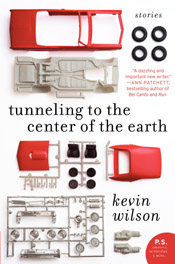A Voice Worth Finding
Kevin Wilson’s first story collection displays great emotional depth—and a few youthful missteps
Young fiction writers in America tend to receive their early training around the workshop tables of college creative writing programs. They next prove themselves in the minor leagues, writing short stories for the handful of respected journals that continue to print them. When the stories are good—as Tennessee native Kevin Wilson’s surely are—the writer is rewarded with a rookie contract to the majors, which is to say, a big-name publisher agrees to put out a collection, with the promise of a (usually yet-to-be-written) novel. The publisher knows the collection will lose money; these days almost no one buys short stories, no matter how good, except perhaps for other short-story writers. But the collection provides a coming-out party for the soon-to-be novelist. It is an act of faith, not so much in anything the writer has done, but in what that writer will do.
 Tunneling to the Center of the Earth proves that Harper Perennial’s faith in Wilson was justified (more about that in a moment), but the book also illustrates the foibles inherent in the farm-team system that currently gives this country its new literary voices. The rookie writer is constantly searching for and honing that voice, a task which requires experimentation with style. Nothing wrong with that. But lump all the experimentation between two covers, and readers are left wishing for the literary equivalent of iTunes, so they can just order the good numbers. A debut story collection tends to read the way Johnny Cash’s first album would have sounded if it had included a little opera and punk along with country. It’s no surprise, then, that some of Wilson’s freshman stories sound like fingernails on slate while others resonate with a pure voice the reader cannot shake.
Tunneling to the Center of the Earth proves that Harper Perennial’s faith in Wilson was justified (more about that in a moment), but the book also illustrates the foibles inherent in the farm-team system that currently gives this country its new literary voices. The rookie writer is constantly searching for and honing that voice, a task which requires experimentation with style. Nothing wrong with that. But lump all the experimentation between two covers, and readers are left wishing for the literary equivalent of iTunes, so they can just order the good numbers. A debut story collection tends to read the way Johnny Cash’s first album would have sounded if it had included a little opera and punk along with country. It’s no surprise, then, that some of Wilson’s freshman stories sound like fingernails on slate while others resonate with a pure voice the reader cannot shake.
“Birds in the House,” for example, is the story of a 12-year-old narrator who has been chosen by his grandmother to judge an odd contest between his father and three estranged uncles, a match that will decide the fate of the family estate, a dilapidated plantation house in middle Tennessee. The grandmother, a Japanese war bride, has left a will stipulating that the brothers fold 1,000 paper cranes, 250 each, which large fans will then blow off a table, leaving one crane that contains the name of the estate winner. “Faced with the finality of the decision, the possibility of losing this house, perhaps she hoped they would come to their senses and make one last attempt at reconciling,” the narrator explains of the bequest. “And yet, it makes me sad to think that maybe my grandmother, tired from years of unhappiness, had given in to whatever runs in the Collier blood that makes us hurt one another.” As the birds whirl and fly, the story rises toward an ending that is fittingly Southern Gothic and yet hauntingly real.
A debut story collection tends to read the way Johnny Cash’s first album would have sounded if it had included a little opera and punk along with country.
Southern Gothic of the Boo Radley variety dominates “Go, Fight, Win,” the story of a romance between a reluctant cheerleader with a penchant for model cars and her younger, possibly autistic firebug neighbor. Penny, the cheerleader, lives in a cramped apartment with her single mother, and feels like a fraud for caring nothing about football or the concerns of the other girls on her squad. During a racially charged confrontation with cheerleaders from another school, she flings a water bottle from a bus and catches a rival in the eye, knocking her down, to the cheers of her teammates. “Penny still couldn’t understand what had happened, felt sick to her stomach,” Wilson writes, “but she was smiling, happy to have made someone else happy.” The other person she tries to make happy is a clearly disturbed neighbor boy who is handy with a lighter. When flames—both literal and metaphorical—begin to spark between the two, they form an odd alliance of misfits. The pain of adolescence, which is at the center of many of Wilson’s stories, is a living, palpable thing here, dancing about like the fire from the boy’s Zippo.
A similar painful realism infuses “Mortal Kombat,” the tale of two awkward teenagers who fall into a homosexual affair kindled by their joint interest in video gaming. Likewise, in “The Dead Sisters Handbook: a Guide for Sensitive Boys,” a pseudo-academic chapter from an aptly titled fictional reference work that, it gradually becomes clear, isn’t so much a guidebook as a painful attempt by one particularly sensitive boy to deal with his older sister’s suicide.
 Publisher’s Weekly categorizes Wilson’s style as “new weirdness fiction,” which reviewer Ray Olsen explains is an expression that comes from a 2006 anthology of “slipstream” stories, combining odd elements of fantasy or science fiction in an otherwise realistic setting. Unfortunately, the fanciful elements of Wilson’s lesser stories bash away at any pretense of realism so thoroughly that nothing is left behind but heavy-handed metaphor, which overwhelms any chance of the nuance his better work achieves.
Publisher’s Weekly categorizes Wilson’s style as “new weirdness fiction,” which reviewer Ray Olsen explains is an expression that comes from a 2006 anthology of “slipstream” stories, combining odd elements of fantasy or science fiction in an otherwise realistic setting. Unfortunately, the fanciful elements of Wilson’s lesser stories bash away at any pretense of realism so thoroughly that nothing is left behind but heavy-handed metaphor, which overwhelms any chance of the nuance his better work achieves.
Consider, as one of several examples, the book’s title story, in which a group of four friends, all recent college graduates with useless degrees, begin digging in a backyard, until they have created a labyrinth that extends throughout their suburban neighborhood. In tunneling they find purpose that the surface (read adult) world has failed to provide. It might be an apt metaphor, but the story is unreadably unrealistic, infused with obvious physical impossibilities that no reader who has ever held a shovel could fail to note. It would be easier to buy into this premise if the characters were tunneling through the air 30 feet above the town. Then, at least, it would be clear that the story involved physics and tools and actions unlike any possible on planet Earth. A wholly imagined, but physically impossible, undertaking may be just the sort of dazzle of that makes a writer the star of a Tuesday afternoon fiction workshop, but it pales in comparison to the lyrical beauty he brings to his stories of odd, damaged people looking for their place in a confusing—but very real—world.
Kevin Wilson’s great promise lies not in tunneling to the center of Earth, but right here on the surface, tunneling into the thick of humanity. That is where his major-league career surely awaits.


